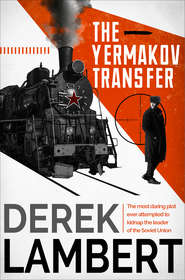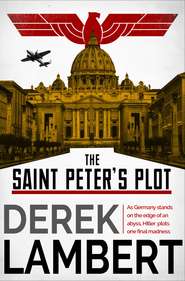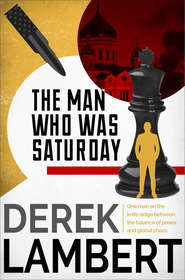По всем вопросам обращайтесь на: info@litportal.ru
(©) 2003-2024.
✖
The Judas Code
Автор
Год написания книги
2018
Настройки чтения
Размер шрифта
Высота строк
Поля
Without warning he strode to the door. Turning, he said: ‘Come on, Brendan, there’s a good chap, you’re keeping me from my bed.’
PART TWO (#ulink_bb9f4bac-b412-52b0-b4a8-1a32d623e3d0)
CHAPTER THREE (#ulink_5f25649a-ba05-5608-9cab-0360b3a1adf4)
By the second week of June 1940 much of Europe lay in ruins, the people dazed and beaten by Hitler’s Blitzkrieg. Poland, Denmark, Norway, Holland and Belgium had fallen and France was poised to throw in the Tricolour.
But in Lisbon you could have been forgiven for forgetting that there was a war on at all.
The sun shone; the boulevard cafés in the cobbled squares and wide avenues were crowded with customers, British and German among them, the broad, flat waters of the Tagus estuary were scattered with ships of many nations; the little yellow tramcars butting along their shining rails and climbing the steep hills were stuffed with cheerful, sweating passengers.
In the grand arenas of the Baixa, business in the banks was brisk, hotels were full, shops were relatively well-stocked. In the precipitous maze of the Alfama, women garlanded their leaning cottages with laundry, dogs slept in the alleyways and the hot air was greased with the smell of grilling sardines.
It was only on closer inspection that you realised that the Portuguese capital had not entirely escaped the war. There was a restlessness abroad in those pavement cafés; conversations were muted, money changed hands surreptitiously. And in the grand hotels, the Avenida Palace and the Aviz, the atmosphere was majestically clandestine.
The perpetrators of this atmosphere were mostly refugees but quite a few were spies. The refugees had flocked to neutral Portugal from the countries over-run by the Nazis, following in the footsteps of the Jews who had fled from Germany itself. Together they formed a cosmopolitan society that shivered with intrigue and suspicion.
At first they all had but one aim – to get out of Europe through Lisbon, the gateway to freedom. The rich usually managed it, liberally tipping the custodians of the city’s portals. Their poorer brethren, those more used to using the tradesmen’s entrance, didn’t escape so easily.
And it was they who were the most furtive. Selling jewellery, worthless bonds, secrets and their bodies if they were well nourished enough. Lying, cheating, cajoling, bribing. Anything to get a berth on a ship or, more ambitiously, on a New York-bound Clipper seaplane or an aircraft flying by night from Sintra airport. For preference a passage to the United States, traditional haven of desperate emigrants; second choices Britain, because, being at war, she was less hospitable to aliens, and South America, which was such a long way off and the sympathies of some of those far-off countries were suspect.
They wore incongruous clothes, these homeless fugitives. Long coats and cloaks, slouch-hats and absurd peaked caps, moth-eaten stoles and peasant blouses. Collectively they looked like extras from a dozen period movies. And the longer they stayed the more threadbare became their costumes, the more humble their homes.
The really tough persevered, in particular the Jews who were used to such privations. Others, dogged by ill-luck, double-crossed by swindlers, took to the hills or one of the shanty settlements on the outskirts of Lisbon where they could share their poverty without humiliation.
Their empty seats in the cafés were immediately filled, their rooms soon occupied by newcomers feverish with optimism. Some were luckier than others, in particular the British – many of them in transit, via Spain, from the South of France – who were accommodated outside the city. After all, Portugal was Britain’s oldest ally even if she had to placate the Germans – you didn’t upset Hitler, not if you were as small and unprepared as Portugal, you didn’t.
On June 13, the eve of the German occupation of Paris and a fine, dreamy day in Lisbon, the plight of the refugees seemed more stark than usual.
Or so it seemed to the tall young man in grey flannel trousers and white shirt striding loose-limbed along the Avenida da Liberdade, the Champs-Elysées of Lisbon, on his way to meet a girl in the Alfama.
It was feira, the Festival of St Anthony of Padua, Lisbon’s own saint, and the groups of dark-clad aliens seemed so remote from it; particularly the children with their hollowed eyes, pale skin and sharp bones. They should have been part of it – the processions, the feasts, the fireworks – because feira is a time for children (and lovers and drunks); instead they sat quietly in their ghetto groups in their peaked caps and too-long shorts, having learned already that insignificance is survival.
But today Josef Hoffman was determined not to be affected by the refugees. He had earned a day off from their suffering.
He had been in Lisbon for a year now, working with the Red Cross. At first his work had been coldly selective, weeding out the frauds – German agents mostly – and the rich from the deserving. With his Czech passport and his way with languages – he was already fluent in Portuguese – he was a natural agent provocateur.
But he had soon sickened of this. He wanted no more contact with spies or men who would offer him 5,000 escudos to help them jump the queue in the American Export Line offices. He wanted to help the helpless, that was why he had joined the Red Cross.
And, although he was only twenty-two, he had grown old with them.
As he made his way across the Praça Rossio, the city’s main square, he could hear firecrackers exploding like gunfire. He stopped and bought a red carnation, its stem wrapped in silver paper, from the flower-seller beside the fountains, to give to the girl whose name was Candida. She was slumbrous and warm-limbed and she would cut the stem off the carnation and wear the flower in her hair that shone blue-black in the sunlight. Hoffman wasn’t in love with her which he thought was a pity.
He left the square and turned up the Rua da Madalena, intending to climb towards the ramparts of the Castelo de São Jorge, St George’s Castle, which stands astride one of Lisbon’s seven hills. Or was it eleven, or thirteen even? The travel guides begged to differ; Hoffman thought it was typically Portuguese, unaware, because he was young, that practically nothing is typical.
He was also unaware that he was being followed by a man carrying a gun, a Russian-made automatic pistol, in the pocket of his raincoat. The man had puffy features and a fleshy nose and he walked as though the pointed brown and white shoes he was wearing hurt his feet; in normal times the heavy gaberdine raincoat and wide-brimmed hat would, together with the shoes, have been conspicuous on a hot evening, but not these days when it was common enough to see a Bohemian or a Slovakian in outlandish clothes hurrying to some secret rendezvous.
Hoffman turned left and began to climb, the walls of the castle ahead of him. He was early for his appointment and intended to spend ten minutes or so wandering around the battlements of the castle with their sensational views of the city and the Tagus.
The man with the pointed shoes followed.
Absorbed with the thought of the pleasures to come that evening, Hoffman almost collided with a woman carrying a basket of fruit on her head; she cursed him but kept her balance with dignity. A procession of children in national dress scattered as a firecracker thrown by an urchin fell hissing in their midst; when it exploded everyone screamed delightedly.
The man in the pointed shoes felt the gun in his pocket, crooked his forefinger round the trigger. The gun felt hot and heavy, like himself. Why couldn’t they have given him an older quarry instead of a mountain goat? Hoffman didn’t have the build of a natural athlete, but he was slim and supple.
Hoffman strode along a short street lined with linden trees and entered the castle grounds. The castle was Phoenician and Moorish and Christian; apart from the walls there wasn’t much of it left.
In a dusty clearing just past the gates teenage girls were performing an impromptu folkdance. They wore long skirts striped in green and gold and red, white blouses and green and red headscarves. A woman spectator bursting with knowledge told Hoffman that they were from the north, affronted that feira in Lisbon was such a discreet affair.
Not in the Alfama, he thought: nothing was ever discreet down there. He walked over to the stone parapet and gazed down at the labyrinth below, rooftops like a discarded pack of mildewed playing-cards. So closely were the hillside terraces packed, so sturdily were they planted, that they had resisted the earthquake which devastated the rest of Lisbon on All Saints’ Day, 1755, and the tidal wave which had followed it. Down there every day was feira.
The man with the pointed shoes moved nearer, paused. He hadn’t expected Hoffman to come to this public place. Indecisively, he turned and looked at the dancers tripping about self-consciously in front of a statue. He put his free hand into the other pocket of his raincoat and fingered the purchase he had made that morning, a dozen firecrackers.
Hoffman gazed across the city and the Tagus, called the Straw Sea, because it was often gold at sunset. It was gold now. So broad was the estuary that visitors often thought that the open sea lay to the left of the city whereas, of course, the Atlantic lay to the right through a narrower channel.
Hoffman walked on towards the remains of the fortifications. Apart from the girls dancing it was aloof from the festival up here. You could feel space. A few Americans carrying cameras strolled the ramparts. Hoffman thought that there would be Americans at the Day of Judgement taking pictures.
He knew one of them, a rangy young man from the American Consulate, who did his best for the endless queue seeking visas to the United States. It was a hopeless task but at least he was polite and he treated all the old ladies as he would treat his mother.
He pointed at the ships becalmed in the golden waters and said: ‘Kind of hard to believe that Europe’s in flames, isn’t it?’
Hoffman asked: ‘Has Paris fallen?’ The American, whose name was Kenyon, knew about such things.
‘Not quite, but it’s there for the taking. Tomorrow, I guess. Then France will quit. The only neutral countries in Europe will be Switzerland, Sweden, Spain, Turkey, Ireland and, of course, Portugal. And Britain will stand alone. But not for long unless some sort of miracle occurs.’
‘Churchill talks in miracles,’ Hoffman said. ‘Dunkirk was a miracle.’
‘A miracle? Perhaps. It was a retreat just the same, a defeat. That’s the kind of miracle they can do without.’
‘I suppose,’ Hoffman said, choosing his words, ‘the sort of miracle they need is American intervention.’
‘Fat chance,’ Kenyon said. ‘Last year Roosevelt promised that there would be no “black-out of peace” in the States. If he does decide to stand for a third term he can hardly go back on his word.’
‘But if and when he does become President again?’
Kenyon shrugged. ‘Perhaps, who knows? But it may be too late. No, Churchill will have to pull that miracle first, and not just with words. If he doesn’t, then one day the whole world will be full of refugees.’
A firework fizzed and exploded. A small boy watched artfully from behind a pillar. Behind him Hoffman caught sight of a man wearing a raincoat and a broad-brimmed hat. He had a lost air about him; a refugee probably. He turned to look at the decorative birds pecking the dust and Hoffman forgot all about him.
The birds were either black or white, the colours of Lisbon’s mosaic pavements. There was even a white peacock.
Hoffman glanced at his watch. In five minutes’ time he was due to meet Candida Pereira. He bade farewell to the American and retraced his footsteps. They would have some bacalhau, cod, served with baked potatoes, onions and olives and one of the honey-sweet desserts washed down with a bottle of vinho verde, and then … well, they might dance in the streets, carouse … and then …
Hoffman walked quicker.
So did the man in the pointed shoes, wincing with each footstep. But at least they seemed to be heading for the teeming streets of the Alfama which was where he wanted Hoffman.
Hoffman plunged into the maze like a rugby player into a loose scrum. Above him the rooftops reached for each other; from the walls hung pots of pink and red geraniums and bird-cages from which only the song of the captives escaped. From the dark mouths of bars came shouting and laughter and music, sometimes Tommy Dorsey or Bing Crosby on scratched phonograph records, sometimes the fado, the lament of Portugal.











